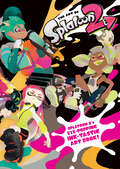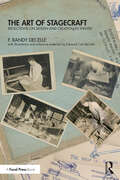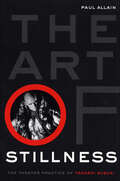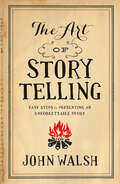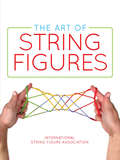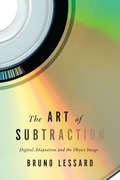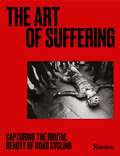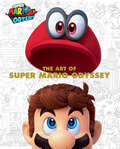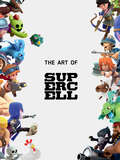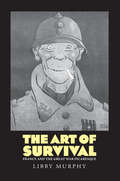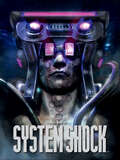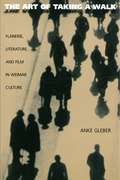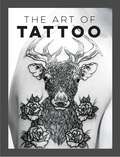- Table View
- List View
The Art of Spiritual Harmony
by Wassily Kandinsky"The Art of Spiritual Harmony" is a seminal work by the pioneering abstract artist Wassily Kandinsky. This influential book delves into the profound connection between art and spirituality, presenting Kandinsky's revolutionary ideas on the role of art in expressing the innermost emotions and transcending the material world.Kandinsky, a master of color and form, articulates his belief that art should go beyond mere representation and tap into deeper spiritual truths. He explores the concept of "inner necessity," the driving force that compels true artists to create works that resonate on a spiritual level. Through a series of essays and reflections, Kandinsky discusses the transformative power of color, the significance of abstract forms, and the artist's role in society.Rich with philosophical insights and artistic theory, "The Art of Spiritual Harmony" offers readers a glimpse into Kandinsky's visionary mind. The book is adorned with illustrations of his groundbreaking paintings, showcasing his journey from figurative art to pure abstraction. Kandinsky's writings inspire artists and art lovers to seek harmony between the spiritual and the aesthetic, encouraging them to view art as a means of personal and collective enlightenment.This timeless work remains a cornerstone of modern art theory, providing invaluable guidance for anyone interested in the spiritual dimensions of artistic expression. "Kandinsky - The Art of Spiritual Harmony" is a must-read for artists, scholars, and anyone seeking to understand the profound relationship between art and the human spirit.
The Art of Splatoon 2
by NintendoAn amaze-ink behind-the-scenes look at the making of Splatoon 2, one of the best-selling Nintendo Switch games of all time!Dive into over 380 pages worth of illustrations, key art, and designs of your favorite colorful characters, weapons, gear, locations, maps, and brands. The Art of Splatoon 2 also features storyboards and other extras sure to make a splash with any fan! Don't miss this ink-redible look at the best-selling family-friendly game Splatoon 2!
The Art of Stagecraft: Reflections on Design and Creation in Theatre
by F. Randy deCelleThe Art of Stagecraft: Reflections on Design and Creation in Theatre is a thoughtful examination of the intersection of design, art, and the modern and contemporary theatrical design practitioner.Utilizing a recently discovered folio of materials of stagecraft practices that was being compiled by Mobile, Alabama artist Edmond Carl deCelle, who was nationally known for his sketches, paintings, murals, Mardi Gras pageants and parades, and theatre productions along the Gulf Coast in the years 1930–1970, the book examines methodologies of production using sketches from the artist as well as his thoughts on design, art, and the shifts that were happening in the industry during the time. The book looks at a sampling of traditional theatrical design and stagecraft practices that became formalized in the mid-20th century and compares them to contemporary practices, offering a reflection on the current state of theatre production, stagecraft practices, and the theatre practitioner as an artist.For those just coming into theatre production, The Art of Stagecraft provides a resource for a selection of well-proven, straightforward techniques that have been developed over many years. For those in theatre production, the book serves as a guide for an assortment of traditional techniques that are still in use today but may not be known by everyone. For all readers, this book will also look at a sample of traditional techniques that have been phased out in favor of contemporary methods due to the development of modern materials.
The Art of Star Wars Jedi: Survivor
by Respawn Entertainment Lucasfilm Ltd.An oversized, full-color hardcover art book collecting concept art and creator commentary from the next chapter in Cal Kestis&’ thrilling saga.Cal and his friends continue to evade the Empire&’s clutches in the dark times following Order 66, but just as a hidden hope reveals itself, new dangers emerge and threaten to destroy everything that the young Jedi has fought to preserve.Explore the creation of the newest Star Wars Jedi adventure with a tome that intimately chronicles the game&’s development—from visionary design to inspirational artwork to stunning final renders. With heroes and villains both familiar and new, breathtaking locales, and incredible ships and weapons, The Art of Star Wars Jedi: Survivor offers a unique look at the inner workings of a galaxy far, far away.
The Art of Star Wars Outlaws
by Massive EntertainmentA FULL-COLOR ART BOOK COLLECTING CONCEPT ART AND CREATOR COMMENTARY FROM THE FIRST-EVER OPEN-WORLD STAR WARS GAME, SET BETWEEN THE EVENTS OF THE EMPIRE STRIKES BACK AND RETURN OF THE JEDI.Developed by Massive Entertainment in collaboration with Lucasfilm Games, Star Wars Outlaws gives players the opportunity to explore distinct locations across the galaxy, both iconic and new, as Kay Vess—a scoundrel seeking freedom from her past with her companion Nix. As the unlikely heroes embark on a stars-spanning series of high-stakes missions, they constantly risk running afoul of rivaling gangs or falling into the clutches of the evil Galactic Empire.The Art of Star Wars Outlaws explores the creation of this underworld adventure with an expertly designed assembly of thrilling imagery and intimate insights from the game&’s creators. Now readers can get down and dirty as they acquaint themselves with charming rogues, plunge into alien environments, examine exotic tools and weapons, and see how Kay Vess was made to defy the odds.
The Art of Star Wars: Visions
by Zack DavissonAn expertly crafted, full-color, oversized volume showcasing the creative forces behind the hotly anticipated animated anthology series!Star Wars: Visions, an original series of animated short films, celebrates the Star Wars galaxy through the lens of the world&’s best Japanese anime creators. Coming in 2021 to Disney+. Dark Horse Books and Lucasfilm invite fans to enjoy the universe of Star Wars from a thrilling new point of view with The Art of Star Wars: Visions.
The Art of Steven Universe: The Movie
by Cartoon NetworkGo behind the scenes of Cartoon Network's highly anticipated film with this unique art book!This magical deep-dive into Steven Universe The Movie is designed by Ryan Sands (Frontier) in conjunction with Steven Universe creator Rebecca Sugar! See preliminary character designs, witness the formation of settings and storyboards, and discover the art that shaped the full-length movie! It's a new kind of artistic adventure with with Garnet, Amethyst, Pearl, and--of course--Steven.
The Art of Stillness: The Theater Practice of Tadashi Suzuki
by Paul AllainFor over forty years, Tadashi Suzuki has been a unique and vital force in both Japanese and Western theater, creating and directing many internationally acclaimed productions including his famous production of The Trojan Women, which subsequently toured around the world. An intergral part of his work has been the development and teaching of his rigorous and controversial training system, the Suzuki method, whose principles have also been highly influential in contemporary theater. Paul Allain, an experienced practitioner of the Suzuki method, re-evaluates Suzuki's work, giving a lucid overview of his development towards an international theater aesthetic. He examines Suzuki's collaborators, the importance of architecture and environment in his theater and his impact on performance all over the world. The Art of Stillness is a lively, critical study of one of the most important and uncompromising figures in contemporary world theater.
The Art of Stone Painting: 30 Designs to Spark Your Creativity
by F. Sehnaz BacTransform ordinary stones into colorful works of art with this easy-to-follow guide. Popular stone artist F. Sehnaz Bac, a seasoned archaeologist who markets her painted Sassi dell’Adriatico (Stones of the Adriatic) on Etsy, presents step-by-step instructions for creating 30 fantastic designs. Full-color photographs accompany directions for painting themes that range from trees, flowers, and animals to mandalas, geometric patterns, holiday motifs, and more. Starting with the basics — including finding and choosing stones as well as tools and materials — the guide offers a variety of techniques, including painting stones with colors or inks, painting on natural stone, and sealing the finished work. Projects range from simple to advanced and include suggestions for indoor and outdoor display, as well as instructions on how to style wearable objects such as pendants. A complete selection of templates provides motifs for every project as well as ample inspiration for developing your own designs.
The Art of Storytelling: Easy Steps to Presenting an Unforgettable Story
by John WalshCan you captivate an audience with your story?Many of us would love to hold the attention of a crowd, a classroom, or just a group of our friends by telling them a great story. We have felt the pressure of a public presentation or the disappointment of telling a story that others ignore. We are ready to be heard, ready to captivate.In The Art of Storytelling, John Walsh takes us through the steps to presenting a compelling story—outlining the strategies that helped him move from stutterer to storyteller. This book will help any person with a story to share by walking you through all aspects of presentation . . . from what to do with your hands as you speak all the way to crafting a killer ending. Whether you&’re telling bedtime stories to your children or Bible stories to a congregation, this book will take your storytelling to a new level.
The Art of Storytelling: Easy Steps to Presenting an Unforgettable Story
by John WalshCan you captivate an audience with your story?Many of us would love to hold the attention of a crowd, a classroom, or just a group of our friends by telling them a great story. We have felt the pressure of a public presentation or the disappointment of telling a story that others ignore. We are ready to be heard, ready to captivate.In The Art of Storytelling, John Walsh takes us through the steps to presenting a compelling story—outlining the strategies that helped him move from stutterer to storyteller. This book will help any person with a story to share by walking you through all aspects of presentation . . . from what to do with your hands as you speak all the way to crafting a killer ending. Whether you&’re telling bedtime stories to your children or Bible stories to a congregation, this book will take your storytelling to a new level.
The Art of String Figures
by International String Figure AssociationCompiled from issues of String Figure Magazine, simple instructions and easy-to-follow photographs offer step-by-step guides to creating more than two dozen captivating string figures, accompanied by brief accounts of their historical background.
The Art of String Teaching
by Michael HopkinsThe Art of String Teaching a hybrid of written text and high-quality online videos is a comprehensive string pedagogy resource covering everything from the origins and history of the string family to advanced-level string techniques. This one-of-a-kind resource has been divided into two parts. In Part I, Michael Hopkins offers an orientation to string education, outlines his philosophical approach to string education, and provides four chapters on the foundational aspects of string playing for beginning string players. Part 2 focuses on intermediate- and advanced-level instruction, touching on such topics as left-hand shifting, vibrato, bowing techniques, tuning skills, improvisation and composition, and music listening, among others. The two concluding chapters offer insight into the string rehearsal and how to run a successful orchestra program. The appendices contain an abundance of practical and convenient teacher resources, including worksheets, flashcards, string repertoire, scales and arpeggios, a template for method book analysis, and sample assessments and rubrics. QR codes throughout the book link to online video demonstrations of string techniques, and the spiral binding is ideal for playing the included string repertoire from a music stand. This book serves as a useful reference guide for professional orchestra conductors, teachers of group string classes, and private studio teachers. It also addresses the needs of students whose primary instrument is not strings and is suited for use in a string techniques or pedagogy course at the college level.
The Art of Subtraction: Digital Adaptation and the Object Image
by Bruno LessardThe Art of Subtraction is the first full-length study on the CD-ROM as a creative platform. Bruno Lessard traces the rise and relatively rapid fall of the CD-ROM in the 1980s and 1990s and its impact as a creative platform for media artists such as Jean-Louis Boissier, Zoe Beloff, Adriene Jenik, and Chris Marker. Although the CD-ROM was not a lasting commercial success it was a vibrant medium that allowed for experimentation in adapting literary works. Building on the work of Gilles Deleuze and Michele Foucault, Lessard establishes a comparative framework for linking digital adaptations with innovative concepts such as 'subtractive adaptation' and the 'object image' that will be of interest to researchers examining literary adaptations on other digital platforms such as websites, smart phones, tablets, and digital games. The Art of Subtraction is a fascinating study of intermediality in the late twentieth century and it provides the first chapter in the yet unwritten history of digital adaptation.
The Art of Suffering: Capturing the brutal beauty of road cycling with foreword by Wout van Aert
by Kristof RamonWhat does it take to become a road racing legend and compete in the toughest sport in the world? Go behind the scenes with the teams and riders at all the major tours and classics through the lens of world-class pro-cycling photographer, Kristof Ramon. The Art of Suffering is about the human story of road racing, what it takes to go deep and be the best, and the awe-inspiring feats of endurance that make road cycling one of the most challenging, most legendary, most inspirational sports in the world.From battling the elements and the terrain to epic climbs, crashes, injuries and recovery; personal sacrifices, pushing the body to the limit, training, winning, losing and long seasons on the road; featuring the domestiques, the star riders, the new talent and the legends - this book captures all the reasons why cycling fans passionately love their sport, taking them closer to the action and their favourite riders than any other book.Carefully curated, thoughtfully designed and beautifully produced - The Art of Suffering is the ultimate gift for cycling fans and features a foreword by Wout van Aert, the subject of Ramon's cover photograph.
The Art of Suffering: Capturing the brutal beauty of road cycling with foreword by Wout van Aert
by Kristof RamonWhat does it take to become a road racing legend and compete in the toughest sport in the world? Go behind the scenes with the teams and riders at all the major tours and classics through the lens of world-class pro-cycling photographer, Kristof Ramon. The Art of Suffering is about the human story of road racing, what it takes to go deep and be the best, and the awe-inspiring feats of endurance that make road cycling one of the most challenging, most legendary, most inspirational sports in the world.From battling the elements and the terrain to epic climbs, crashes, injuries and recovery; personal sacrifices, pushing the body to the limit, training, winning, losing and long seasons on the road; featuring the domestiques, the star riders, the new talent and the legends - this book captures all the reasons why cycling fans passionately love their sport, taking them closer to the action and their favourite riders than any other book.Carefully curated, thoughtfully designed and beautifully produced - The Art of Suffering is the ultimate gift for cycling fans and features a foreword by Wout van Aert, the subject of Ramon's cover photograph.
The Art of Super Mario Odyssey
by NintendoTake a globetrotting journey all over the world--and beyond!--with this companion art book to the hit video game for the Nintendo Switch(TM) system!In October of 2017, Super Mario Odyssey(TM) took the gaming world by storm. Now, discover the art and expertise that went into creating one of Nintendo's best-loved games! This full-color volume clocks in at over 350 pages and features concept art, preliminary sketches, and notes from the development team, plus insight into some early ideas that didn't make it into the game itself! Explore the world of Super Mario Odyssey from every angle, including screen shots, marketing material, and more, to fully appreciate this captivating adventure
The Art of Super7
by Super7Science fiction, giant monsters, comic books, punk rock, skateboarding, robots, and rebellion: these seven elements form the manifesto of pop-culture knowledge, graphics, aesthetics, and DIY energy that is Super7. Join us as we explore each of these obsessions through the creative offerings of one of the premier design houses of lifestyle-oriented collectibles, toys, and apparel.The Art of Super7 explores the art, design, and packaging of official product collections that include G.I. Joe, Universal Monsters, Teenage Mutant Ninja Turtles, Thundercats, Transformers, and Peanuts, in addition to music legends Motorhead, Misfits, Beastie Boys, Ghost, O.D.B., as well as Super7's own in-house creations and many, many more.This oversized hardcover art book enclosed in a slipcase is a celebration of the youthful obsession, nostalgia, and visual innovation of Super7.
The Art of Supercell: 10th Anniversary Edition
by SupercellA first-of-a-kind tome that includes a plethora of art along with commentary showcasing the development of all the Supercell games!!Chronicling each in release order, this volume is a must own for any fan of Clash of Clans, Brawl Stars, Hay Day, Clash Royale, and Boom Beach. Explore each aspect of these games, from developmental concept pieces, to finished, fully rendered environmental shots. This book also gives a one of a kind looks into the games that have never been released, as well as commentary from the Supercell team!Dark Horse Books and Supercell proudly present The Art of Supercell: 10th Anniversary Edition. A perfect retrospective for your collection!
The Art of Survival: France and the Great War Picaresque
by Libby MurphyAn astute literary and cultural history of World War I in France that offers a fresh perspective on the popular culture of the Great War The First World War soldier has often been depicted as a helpless victim sacrificed by a ruthless society in the trenches of the Western Front. In fact, Libby Murphy reveals, French soldiers drew upon a long-standing European tradition to imagine themselves not as heroes or victims but as survivors. Murphy investigates how infantrymen and civilians attempted to make sense of the war while it was still in progress by reviving the picaresque, a literary mode in which unheroic protagonists are forced to fend for themselves in a chaotic and hostile world. By examining works by French and European novelists, journalists, graphic artists, cultural critics, and filmmakers--including Charlie Chaplin--Libby Murphy shows how the rich tradition of the European picaresque was uniquely appropriate for expressing anxieties provoked by modern, industrialized warfare.
The Art of System Shock
by Robb WatersA full-color hardcover art book chronicling the renowned Nightdive Studios&’ faithful recreation of the iconic cyber-sci-fi action thriller video game, System Shock!When a powerful artificial intelligence named SHODAN is liberated of her ethical constraints, the inhabitants of the Citadel space station are rapidly corrupted into bloodthirsty cyborgs and mutants and placed under her control. It&’s up to a resourceful rogue hacker to traverse the station level by level, battling the monstrous crew and computer-controlled robots before ultimately facing down with the AI herself! Now fans of the groundbreaking cyber-action shooter can explore the development of the lovingly recreated System Shock in intricate detail—including art of Citadel Station&’s mysterious interiors, vile enemies, clever props, and much more. Nightdive Studios and Dark Horse Books invite readers to relive the unforgettable experience of the classic game, remade with enormous care for a new generation. Celebrate the return to Citadel Station with The Art of System Shock.
The Art of Taking a Walk: Flanerie, Literature, and Film in Weimar Culture
by Anke GleberAnke Gleber examines one of the most intriguing and characteristic figures of European urban modernity: the observing city stroller, or flaneur. In an age transformed by industrialism, the flaneur drifted through city streets, inspired and repelled by the surrounding scenes of splendor and squalor. Gleber examines this often elusive figure in the particular contexts of Weimar Germany and the intellectual sphere of Walter Benjamin, with whom the concept of flanerie is often associated. She sketches the European influences that produced the German flaneur and establishes the figure as a pervasive presence in Weimar culture, as well as a profound influence on modern perceptions of public space. <P><P>The book begins by exploring the theory of literary flanerie and the technological changes--street lighting, public transportation, and the emergence of film--that gave a new status to the activities of seeing and walking in the modern city. Gleber then assesses the place of flanerie in works by Benjamin, Siegfried Kracauer, and other representatives of Weimar literature, arts, and theory. She draws particular attention to the works of Franz Hessel, a Berlin flaneur who argued that flanerie is a "reading" of the city that perceives passersby, streets, and fleeting impressions as the transitory signs of modernity. Gleber also examines connections between flanerie and Weimar film, and discusses female flanerie as a means of asserting female subjectivity in the public realm. The book is a deeply original and searching reassessment of the complex intersections among modernity, vision, and public space.
The Art of Tapestry Weaving: A Complete Guide to Mastering the Techniques for Making Images with Yarn
by Rebecca MezoffPut aside those preconceptions of dusty, medieval tapestries hanging on castle walls! Tapestry weaving has a whole new look, and fiber enthusiasts of all levels are eager to try their hand at creating images with yarn. Rebecca Mezoff, a renowned teacher of contemporary tapestry weaving, shares her techniques in this in-depth guide to every aspect of the process, from developing a color palette to selecting yarn, warping the loom, and weaving the image. Crafters can choose from inexpensive tabletop and hand-held looms to larger floor looms. Detailed step-by-step photos and inspiring examples from a range of weaver-artists make this a one-stop resource for tapestry weaving how-to. This publication conforms to the EPUB Accessibility specification at WCAG 2.0 Level AA.
The Art of Tasha Tudor
by Harry DavisThe Most Comprehensive retrospective to date of one of America's most iconic artists, The Art of Tasha Tudor is the finest harvest of her remarkable art and extraordinary lifestyle. Harry Davis draws from more than 10,000 pieces produced by Tasha Tudor, and here includes 150 of her finest paintings and drawings, including holiday cards, illustrations from her classic children's books, fashion designs she made for Pierre Deux, and samples from her personal sketchbooks. This is the Definitive look at how Tasha Tudor's life has created her art, how her art has shaped her life, and why it is essential to view them together to best appreciate her gracious legacy. Davis provides detailed biographical information, everything from the origin of Tasha's name to how she raised four children on her own, in order to illustrate the amazing connection between her life and work. A longtime confidant of Tasha Tudor, Davis details his most personal memories of the good and bad times they shared together.
The Art of Tattoo
by Lola MarsThe Art of Tattoo brings you a stunning collection of the most intricate, unique and exquisite tattoos. Showcasing a range of innovative styles as well as traditional designs, and packing a punch of colour and charisma, every one of the tattoos in this book is proof that a tattoo is not just ink; it’s art.

